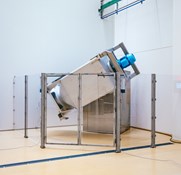


The Intrafood:24 seminar programme covers two current topics: ‘Applying AI in product development’ and ‘Contemporary, healthy nutritional concepts with sustainable natural ingredients’, explains Professor Koen Dewettinck (Ghent University) at this edition of the Intrafood fair to be held on 25 and 26 September 2024.

On 24 April 2024 the European Union radically altered its regulations on smoked flavourings. “This decision has turned the food industry on its head, with major consequences for the products we all love”, says Yaron Vanwildemeersch of Food Ingredients Technologies.

How Nutrients Affect Human Health and Metabolism

‘Food manufacturers can add more healthy ingredients. If we innovate through the addition of vegetables, fruits and whole grains as ingredients, consumers automatically get more healthy nutrients,’ says Michael Sels, chief dietitian at Antwerp University Hospital. ‘The important thing is that consumers find the products appealing and appetising.’

Naturally occurring magnesium chloride (MgCl2) is a healthy, innovative alternative to sodium chloride (NaCl), commonly known as salt. Nedmag introduced this product to the market in February. Application Technologist, Jetze Wijnia discusses the benefits. “The ingredient, or additive, is not only natural but can also reduce the amount of sodium in...

Food companies use additives in their products for specific functions, says FEVIA, the federation of the Belgian food industry. “Statements against 'ultra-processed' foods are often scientifically unfounded."

How can microorganisms be used to manufacture alternative (milk) proteins? This can be achieved in two ways, explained Julia Keppler of Wageningen University & Research at the spring congress of the Society for the Advancement of Dairy Science.

‘The average Belgian is still Burgundian at heart. If producers of prepared meals use additives, it is because they - like the other ingredients - have a purpose. It is a fallacy that all sorts of things are added to meals just for no good reason,’ explains industry federation director Anneleen Vandewynckel.

“We are receiving a growing number of enquiries from our clients on the prevention of cross-contamination in the mixing and packaging of dry ingredients for the food industry", says Domien Sierens of Food Blending. “Hygiene and quality assurance are our top priorities".

At the Tavola gastronomic trade fair, from 17-19 March, Maisonie will launch four flavours of dessert with extra protein. In nutritional terms, two are sources of protein and two are rich in protein, Nathalie Van der Straeten tells us. She also reveals which plant proteins have been added.

“Nutritional supplements are safe products with an established legal framework. Before they enter the market, a notification file must be submitted to the Federal Public Service for Health", stresses Valerie Vercammen of the professional Federation be-sup.

What exactly will today's consumers want on their plates tomorrow? It is with this rather tricky question in mind that food companies are constantly striving to develop products that meet the needs of even the most discerning gourmets.